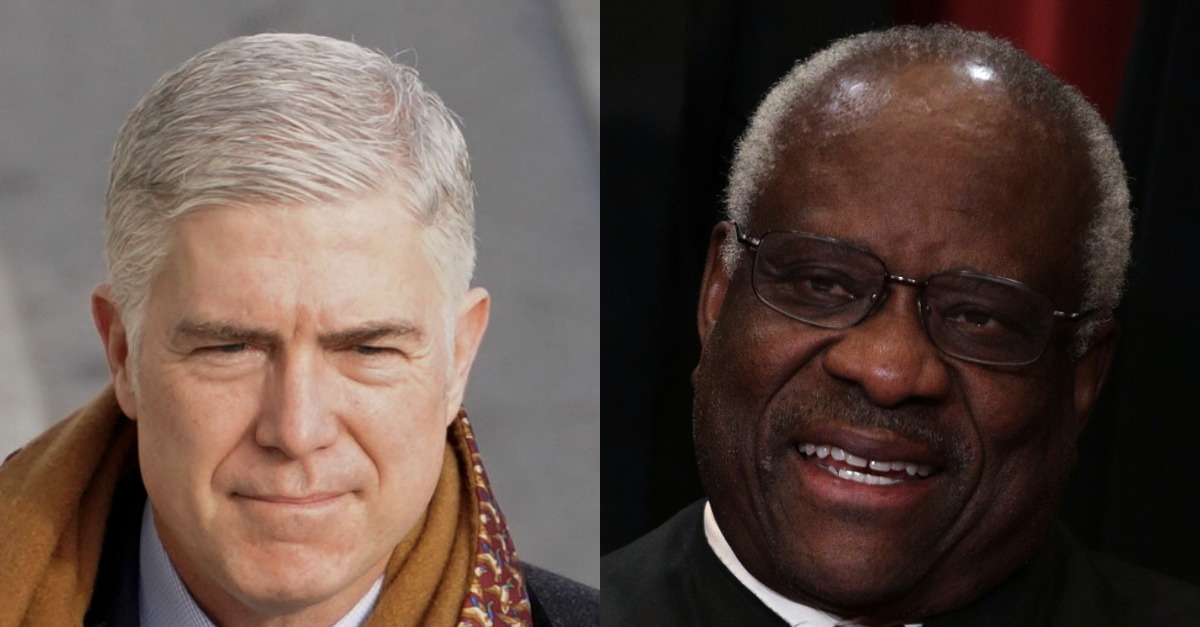
Two of the Supreme Court’s most fervent advocates for religious freedom spoke out about the justices’ refusal to hear the appeal of a Florida city sued by a group of atheists for holding a prayer vigil for victims of a 2014 shooting. According to Justices Neil Gorsuch and Clarence Thomas, current Establishment Clause jurisprudence does not allow the atheists to bring lawsuits simply over being “offended” after attending such an event.
Initially, four plaintiffs sued the City of Ocala: Lucinda Hale, Daniel Hale, Jean Porgal and Art Rojas. Since the filing, though, Daniel Hale and Jean Porgal have both died.
The plaintiffs attended the Ocala prayer vigil, which had been arranged by a local NAACP leader and a local minister in conjunction with Ocala police. Lucinda Hale testified that the vigil was “similar to a Christian revival.” Hale said she was “concerned about alleviating crime but felt unable to participate in the vigil because the speakers invited the audience only to pray and sing.”
The district court granted summary judgment to the plaintiffs, and the City appealed, challenging both the plaintiff’s standing and the merits of their underlying claims. The U.S. Court of Appeals for the Eleventh Circuit sided with the plaintiffs on standing. However, because the Supreme Court ruled in favor of the “praying football coach” in Kennedy v. Bremerton while the Ocala appeal was pending, the appeals court remanded the case for more proceedings on the Establishment Clause claim.
The Bremerton case upended the longstanding “Lemon test” for analyzing Establishment clause violations. The test, named for the 1971 case of Lemon v. Kurtzman, mandated that government action must have a primarily secular purpose. Even before Bremerton was decided, current and former justices were highly critical of Lemon.
In its decision in partial favor of the atheist plaintiffs, the Eleventh Circuit quoted former Justice Antonin Scalia, who described Lemon as “some ghoul in a late-night horror movie that repeatedly sits up in its grave and shuffles abroad, after being repeatedly killed and buried.”
In its ruling in the Ocala case, the Eleventh Circuit nodded to the late conservative justice while pondering the ruling in Bremerton:
After this appeal was filed, however, the Supreme Court drove a stake through the heart of the ghoul and told us that the Lemon test is gone, buried for good, never again to sit up in its grave. Finally and unambiguously, the Court has “abandoned Lemon and its endorsement test offshoot.”
Despite the potentially profound effect the Bremerton ruling could have on the plaintiff’s Establishment Clause claim regarding the prayer vigil, the primary issue presented to the justices at this point was standing.
Former Donald Trump lawyer and band frontman Jay Sekulow asserted on behalf of Ocala that “psychic or emotional offense” alleged by the atheist plaintiffs is not enough to confer standing to sue, particularly given that the plaintiffs “deliberately [sought] out the exposure” to the prayer vigil.
The high court, however, was not keen on addressing the question of whether an “offended observer” would have Article III standing at this point in the case.
Still, both Gorsuch and Thomas issued individual statements on the denial to comment on the issue of standing.
In a two-page statement, Gorsuch expressed serious doubts as to whether atheists who were simply “offended” because “prayers reached their ears” have standing to sue.
Gorsuch wrote that the chief of police organized the event in question to heal the community that had suffered tragic violence. Due to the plaintiffs, though, “instead of unity, litigation followed,” wrote the justice.
Gorsuch focused on one plaintiff’s expectations rather than the government’s role in the event and pointed out that she “went to the vigil knowing that she would be offended.” He said that the Supreme Court has never endorsed a legal standard that would allow an “offended observer” to sue.
Still, Gorsuch allowed that the denial of certiorari was proper, because the Eleventh Circuit’s ruling remanded the case to the district court — which has a chance to interpret the law as Gorsuch would.
Thomas had even more to say on the matter, and expressed “serious doubts about the legitimacy of the ‘offended observer’ theory” over six pages.
Thomas quoted from past precedent that “[H]urt feelings differ from legal injury” and warned that allowing offended observers to sue would “warp the very essence of the judicial power vested by the Constitution.” Thomas argued that the Supreme Court should take up cases like this one, because “time has demonstrated that this problem is not going away by itself” — the “problem” being lower courts that are bound by circuit court precedent to recognize standing.
Though the Supreme Court has been highly protective of the rights of individuals and groups to exercise their respective religions in recent cases, many recent cases were the product of litigation initiated by those claiming to have been stifled by government policies. By contrast, City of Ocala v. Art Rojas raises the claims of atheists who claim to have been injured by a municipality hosting an overtly religious event.
You can read the justices’ full statement on the denial of certiorari here.
[images: featured Melina Mara – Pool/Getty Images and Alex Wong/Getty Images; inline via U.S. Supreme Court]
Have a tip we should know? [email protected]

